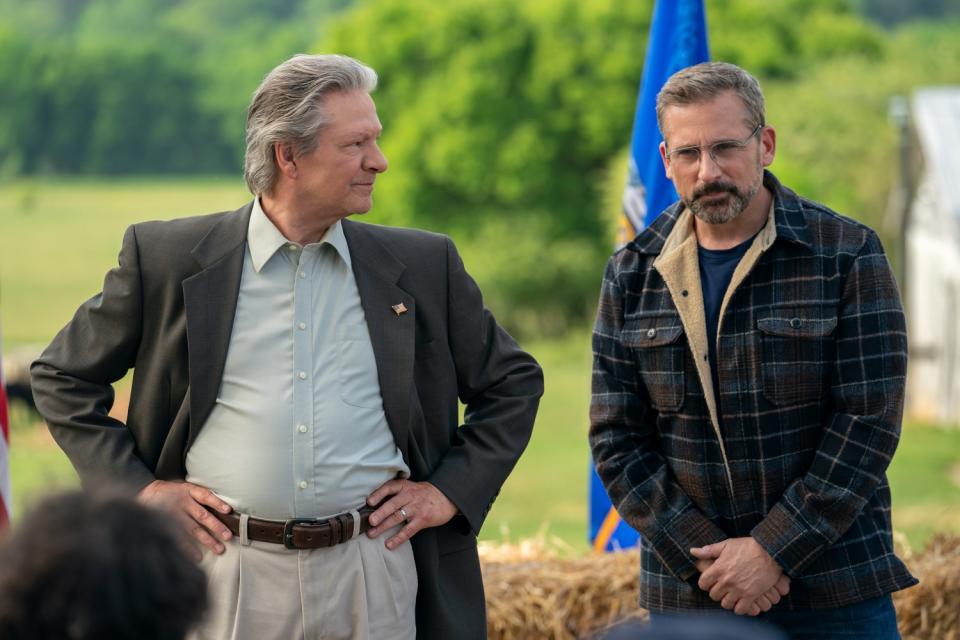Review: Jon Stewart's off-key political comedy, starring Steve Carell, is far from 'Irresistible'

Like a lot of movies set in an alternate political reality, Jon Stewart’s “Irresistible” is a satire that feels closer to science fiction — and not the dystopian kind. It was shot last year and thus unfolds in an America untouched by pandemic or visible signs of protest. Bitter partisan invective certainly exists, though it has been stripped of any real outrage and given a slick screwball sheen. The tone is cautiously optimistic; the cynical Beltway insights come wrapped in an upbeat smile. The story may take place some time after President Trump’s 2017 inauguration but in tone and spirit, it feels like the product of an earlier, less contentious era.
You could place that era sometime around 2015, when Stewart stopped hosting “The Daily Show.” At the time, many of us lamented that one of our most incisive commentators wouldn’t be around to give the 2016 election season the rigorous scrutiny it deserved. Stewart has hardly been silent in the years since, as his political advocacy and appearances with his friend Stephen Colbert on "The Late Show" have made clear. But “Irresistible,” the first movie he’s written and directed since his 2014 drama, “Rosewater,” has little interest in treating the current administration as a satirical target.
From a wry opening montage of Trump, Hillary Clinton, Barack Obama and other presidential candidates on the campaign trail, chowing down with locals in diners while Bob Seger croons “Still the Same,” it’s clear that the movie means to indict not an individual but a more generalized state of political inertia. “Irresistible” styles itself as a bipartisan call to arms. It asks us to direct our rage not against one another but against the structure by which we elect our leaders — a cash-clogged, ego-driven two-party system that has proved dispiritingly out of touch with working-class voter concerns.
It's a fair point, and a hard one to argue with. But I found myself arguing a lot with “Irresistible,” whose attempts to soothe our national tensions strike me as dodgy and disingenuous, and whose narrative priorities feel bizarrely misjudged. Some of this is surely due to unfortunate timing; it’s not easy to sell a high-minded comedy at a moment that cries out for a seething polemic. But timing alone doesn’t account for it. If this misleadingly titled movie is meant to be a whimsical Capra-esque fantasy, as the production notes suggest, then why does it make such a show of its topical relevance? If it’s meant to lay bare the realities of the system, as the production notes also suggest, then why does it feel so toothless and inconsequential?

The movie, to be fair, wants to show that seemingly inconsequential matters can have enormous impact. Or so believes Gary Zimmer (Steve Carell), a veteran Democratic strategist who is introduced banging the drum for Clinton in 2016. Months after that stinging defeat, he’s ready to leap back into the fray by turning one Col. Jack Hastings (Chris Cooper) into the future face of his beleaguered party. A dairy farmer and Marine veteran from a sleepy, economically blighted Wisconsin town called Deerlaken, Jack is no one’s idea of a liberal poster child, which is why Gary finds him so promising.
A video of the colonel passionately defending the town’s undocumented workers has gone sufficiently viral to persuade Gary to make his way to Deerlaken. Some amusing if obvious fish-out-of-water comedy ensues as Gary, who travels by private jet and exudes jittery D.C.-insider energy, draws suspicious glances from the locals, though also a few friendly smiles. In time he persuades Jack to run as a Democrat against the town's Republican mayor, Braun (Brent Sexton), as part of a plan to woo heartland voters leftward and demolish the idea that conservatives have a monopoly on family values, military heroism and love of country.
Gary’s tactics have their desired impact, and before long camera crews and data-crunching consultants have descended on Deerlaken, some of them at the command of Gary’s ruthless Republican nemesis, Faith (a wickedly funny Rose Byrne). The ensuing hullabaloo, although packed with twists, setbacks and a bizarrely unfunny cameo by Bill Irwin, has its roots in reality. (Jack Hastings was partially inspired by Jon Ossoff, the upstart Georgia Democrat who almost flipped a conservative House district in 2017 and is now challenging David Perdue, his state’s senior Republican senator.) But Stewart is also riffing on the durable populist-humanist tradition of Frank Capra, whose small-town Everyman parables affirmed America’s ability to live up to its greatest democratic ideals.
At the same time, those films were curiously reluctant to get too specific about what those ideals should be. Movies like Capra’s “Mr. Smith Goes to Washington” — and some of its latter-day descendants, such as “Swing Vote” (2008) — are political comedies notably scrubbed of any real politics. The same can’t quite be said of “Irresistible,” which sometimes steals a glance in the direction of sharper, more cynical entertainments like “The Candidate.” In that 1972 film, Robert Redford plays a Democratic senatorial hopeful who actually has views on things like welfare, abortion and workers’ rights but learns to couch those views in the media-savvy language of euphemism and spin.

Stewart can deconstruct and satirize that language as well as anyone. He demonstrated this on “The Daily Show” and occasionally demonstrates it here, mainly through Gary and Faith’s escalating stunts and outlandish TV spots. While it may be superficially on Gary’s side, “Irresistible” views their gleeful one-upmanship with sly detachment. Faith, resembling some unholy mashup of Kellyanne Conway and Kayleigh McEnany, is an unscrupulous operator. But as Jack’s sharp-witted daughter, Diana (a very good Mackenzie Davis), rightly points out, Gary is no better, with his ignorant condescension toward the rural Americans he’s ostensibly fighting for.
It’s all just a game to Gary, whom Carell plays like a distant cousin to “The Office’s” Michael Scott — slicker and more calculating, to be sure, but fundamentally just as clueless. He works for a political apparatus that ignores issues, weaponizes dissent, mines scandal for entertainment, funds campaigns rather than solutions and ultimately serves no end beyond its own survival. Jack, played by Cooper with the perfect note of aw-shucks gravitas, succinctly lays this all out when he speaks at a fancy New York fundraiser attended by Democratic power players. It’s ridiculous that he has to be there, he tells them. It’s ridiculous that they have to be there, too.
Again, it’s a fair point. It also feels like a cop-out, a way to absolve Jack and the movie of any need to advance any coherent or substantive political views of their own. If everything is smoke and mirrors and no one cares about the issues, we don’t need to care either, right? That blasé attitude becomes jarringly clear whenever the story briefly jokes about — and then abruptly pulls away from — the subject of race, as when Gary gently ribs the liberal East Coast crowd for neglecting white rural folks like Jack and getting too cozy in their “ideological bubbles” (cue tittering people-of-color reaction shots).
Can a movie really satirize a person’s cluelessness when it seems to share it? How a divided political party should direct its energy and focus is an endlessly debated subject that might have yielded its own razor-sharp comedy, especially in an election year. “Irresistible,” for all its showy both-sides-ism, makes its thoughts on the matter quite clear. The hardworking, mostly right-leaning white citizens of Deerlaken are given narrative pride of place, and played by some excellent actors (among them Will Sasso, Will McLaughlin and Blair Sims). Curiously, they also emerge as something rather less than fully imagined characters; their ideological views, personal histories and individual hopes and dreams are left unexamined for reasons that become clear as the story progresses.
As a conservative-seeking olive branch, then, “Irresistible” doesn’t quite rise to the level of those soul-searching news stories that proliferated in the wake of Trump’s election, scouring rural outposts for the weary soul of an America that time forgot. As a liberal self-critique, it feels almost surreally divorced from present-day reality. I guess that's one form of bipartisanship.

